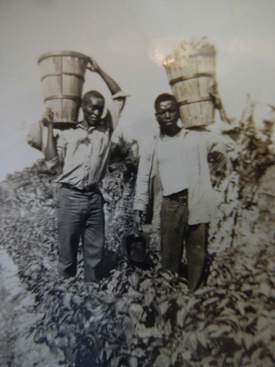Morikami Sukeji, who came to America as a member of the Yamato Colony in South Florida and stayed there alone until the end of his life after the colony was disbanded, continued to write letters to his sister-in-law and her family after the war. At one point, the sale of a plot of land was about to be sold, but it didn't go through because of the Korean War. However, he also developed a friendship with a girl.
* * * * *
Month x day 1950
<Land sale canceled due to Korea incident>
I have received five of your letters. I apologize for not replying to them properly. Please calm down and read them. A month ago, I sold part of my property for a considerable amount of money. I was happy that I was able to fulfill my promise to you, pay off my debts, and have enough capital for my business.
However, as the saying goes, good things come with many troubles, and because of the sudden Korean incident (the Korean War, which broke out on June 25, 1950), this promise was cancelled. This is understandable. When war breaks out, no one will invest in residential areas. So, we have no choice but to move up the schedule and start collecting the unpaid seedling fees, but it is difficult. As you know, if you have been a farmer in this area for the past 40 years, you will understand. In nine cases out of ten, the farmers are suffering from a deficit, so they will not pay. In fact, they cannot pay.
I too have been racking my brains over what to do next. But there is no need to worry. Hard times are easy, and I think we will be able to make some arrangements. Anyway, I sent you fifty dollars by postal money order the day before yesterday. I think this will arrive more quickly than before.
As long as humans live, unexpected things will happen one after another. We cannot survive if we are tormented by each and every occurrence and only look at the dark side of things.
I am not a fatalist, but thanks to the hardships I have endured over the years, I have come to understand things in a positive light and see the dark side of things. I have become much more disciplined. However, when I cannot keep my promises, I suffer from a sense of responsibility.
Mi-san (Mitsue Okamoto, my sister-in-law), please try not to worry too much about things. Worrying about unnecessary things is not bad for your health. My mother was strong-willed, but she worried too much and suffered a nervous breakdown, to the point where her doctor gave up on her. So she started smoking on the doctor's advice, and the results were good, and she probably continued to smoke for the rest of her life. Why don't you give it a try?
<Wild rabbits eat the seedlings>
It's seven o'clock now, and I've just started preparing dinner. Today, I finished work just after four o'clock in the evening, and took two black employees to town. We were planning to buy groceries and go to the movies for the first time in a while, but I was worried about the nursery, so I decided not to go.
When seedlings are in short supply, they are often stolen while you are away. Last year, while I was out of town, over 100 dollars' worth of pepper seedlings were stolen.
On top of that, a damn rabbit came this evening and started eating my precious seedlings. It was already pitch black at 6:30, so I shone the car light on them, took out my blowgun and blew them away. Rabbits never eat dirty things.
Becoming friends with children
I received a letter yesterday from an old friend of mine, a girl named Vivienne Perks, a second-grader in elementary school, with big blue eyes and a friendly personality.
Last winter, my parents and I came here to spend the winter, lived in a trailer near my farm, and returned to my hometown of Kentucky in March. My dad is a carpenter. My son loves cats, so he brought along a calico cat named Chee.
The letter from the child said:
"Thank you so much for all the mangoes. I have never eaten such delicious fruit. Chi was hit by a car and died. I cried for a long time. I buried her under the peach tree in the field behind our house. I arranged various flowers and plants for her. I will go to Florida again when it gets cold."
I comforted her by promising to find a cute cat like Chi. Here, children learn to take care of themselves from an early age. I think this is a very good thing.
<A mosquito that looks like a dragonfly?>
This year, there have been a lot of westerly winds, and therefore a lot of mosquitoes, which can be a nuisance even during the day. I've heard that there are about six kinds of mosquitoes. Mosquitoes originate in the swamps in the west of the area, and come on the westerly winds. The larger ones are about the size of a dragonfly, and fly through the sky making a sound like an airplane.
That's a lie, but sometimes I see them about three-quarters of an inch in size. When they get their fill they hold about a teaspoon of blood. These guys make a buzzing noise as they fly away. That's all for today.
(Author's note)
Reference: Yamato Colony and Morikami Sukeji. From "Yamato Colony: The Men Who Left Japan in Florida" (by Kawai Ryusuke, Shunposha)
© 2019 Ryusuke Kawai







